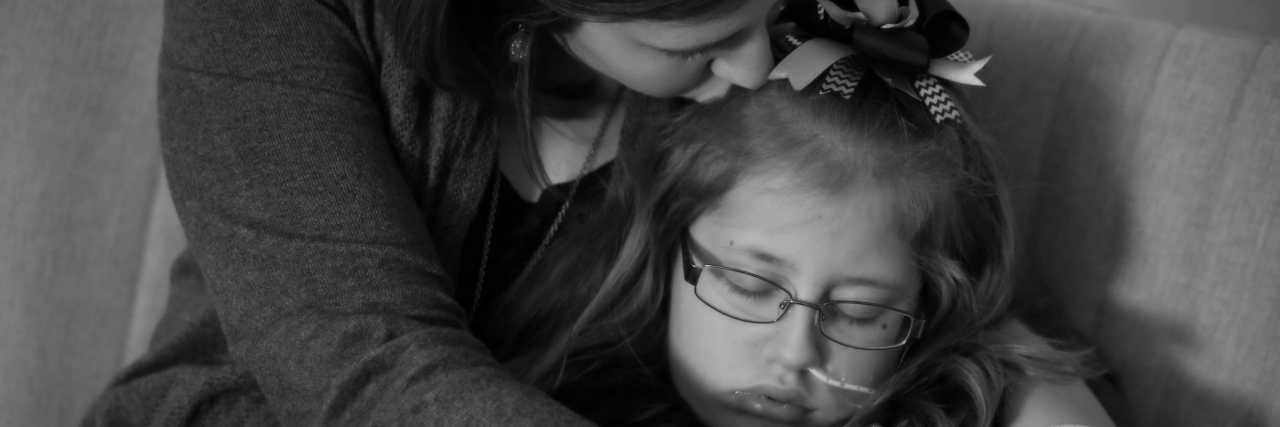Two years and one day ago I tucked a healthy, neuro-typically developing child into bed. That night and memory now feel a life time away. Because two years ago that same child and I both woke up in a different world. The world of life-threatening illness and disability. And time has since stood still. In many ways, despite just describing those memories as a lifetime apart, that morning– the one her eyes went vacant– still feels like it was yesterday.
By my recollection, Gracie’s condition, a monster we now know to be autoimmune encephalitis, took her overnight. But the calendar tells a different story. There’s a year of which I remember very little. I can tell you with detail the symptoms that developed, the tests that were run, the procedures she went through, and the times I thought we lost her – but those experiences always have the word “just” in front of them. We “just” tested for that. She “just” lost her words. We “just” started a new treatment. Time has become such an elusive thing. But for all the days I don’t remember, I remember people.
I remember the doctors in her room. Those with new ideas. Those with old ideas. Those with no ideas. Those with hope. Those whose eyes held sadness. And those fighting for my girl. I remember the nurses. Those holding her hand and those holding mine. Those putting in IVs and PICC lines, and those running life-saving drugs through her veins. My heroes wore stethoscopes.
What Gracie remembers is those who were explaining things to her when I couldn’t think to. Those who were distracting her. Those holding iPads and performing similar procedures on her stuffed tiger. Her heroes wore pink scrubs.These people were a department called child life. These people all mark time.
And I remember phone calls. And texts. And feeling frozen. I remember people asking what they could do and what they could bring. But I never remember answering. What I do remember are people who showed up, even without answers. Those who brought coffee and clean socks. Grandparents who cared for my other children, and people who stood in the room with Gracie while I visited with my boys in the hallway. I remember a friend who walked in and said, “Go sleep, I’ll stay.” I remember my sister who literally gave me the shirt off her back.
These people understood what many so many didn’t. Amid life and death decisions, I didn’t have time to make the decision to take care of me, but I am forever thankful they did.
People like that are rare.
Many people flocked in, and blew up our phones. Countless more found us on social media, or reached out to our loved ones. They all had good intentions, but they didn’t have a clue. These were the people who would say, “It’s going to be OK,” or “Stay strong.” And I was completely frustrated. How did they know it would be OK? And what did they know about strength? They’d also say things like, “I know there’s a reason for this.” And I’d want to scream, “There’s no reason good enough for my baby to suffer.” These people didn’t mean to strike a nerve, though. I now know they were scared too, and trying to fill silence.
Ironically, what I really needed was someone to sit in that silence with me.
I needed someone to see and validate that there weren’t words.
I needed someone to cry with me.
I needed someone who needed nothing from me, as I had no more to give.
No words — not even “coffee with vanilla, please.”
No strength either. I couldn’t say, “It’s going to be OK,” when I didn’t yet believe it.
Another year has passed, and this is becoming our new normal. My Gracie Girl’s journey isn’t over. But time is now on our side. And today I can hope that she’s going to be OK. I’ve learned in times of crisis that sometimes the best thing you can say is nothing. And it’s not a lesson I’d wish on anyone – but it’s one anyone can take away.
When your loved ones are hurting, when crisis strikes, don’t worry about fixing problems. Your words are unlikely to be heard, let alone serve as the pillar of strength they need.
But, when it comes down to what you can do, you can be there. Bring clean socks and underwear if you’re close enough. If you must talk and if the silence is too much, than simply say “It’s OK that today this isn’t OK.”
You are what they need.
Time will do the rest.

